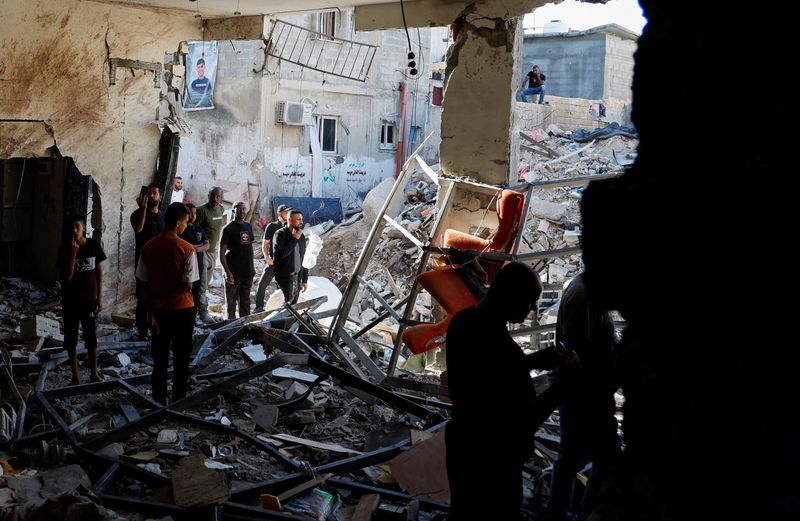By Ali Sawafta
TULKARM, West Bank (Reuters) -The ruins of a coffee shop in the West Bank city of Tulkarm show the force of the airstrike on Thursday night that killed at least 18 people including a senior local commander of the militant group Hamas.
The strike in Tulkarm refugee camp, one of the most densely populated in the occupied West Bank, destroyed the ground floor shop entirely, leaving rescue workers picking through piles of concrete with the smell of blood still hanging in the air.
Two holes in an upper level show where the missile penetrated the three-storey building before reaching the coffee shop, where a mechanical digger was clearing rubble on Friday.
The strike by the Israeli air force was the largest seen in the West Bank during operations that have escalated sharply since the start of the war in Gaza almost a year ago, and one of the biggest since the second "intifada" uprising two decades ago.
"We haven't heard this sound since 2002," said Nimer Fayyad, owner of the cafe, whose brother was killed in the strike. "There is no safe place for the Palestinian people. The Palestinian people have the right to defend themselves."
The Israeli military said the strike killed Zahi Yaser Abd al-Razeq Oufi, head of the Hamas network in Tulkarm, a volatile city in the northern West Bank that has seen repeated clashes between the Israeli army and Palestinian fighters.
Israeli military spokesperson Avichay Adraee said the military had verified that at least seven militants were killed in the attack, including Ghaith Radwan, a prominent commander from the Iranian-backed Islamic Jihad militant group.
He said the strike had been carried out "as they met to plan a terrorist attack against the State of Israel in the immediate term".
The United Nations Human Rights Office said the attack was "part of a highly concerning pattern of unlawful use of force" by Israel in the West Bank.
ATTACK KILLS FAMILY OF FIVE IN APARTMENT
There was no immediate confirmation from either faction but Palestinian emergency services said at least 18 people had died in all, including a family of five in an apartment in the same building.
The missiles penetrated their ceiling and the floor of their kitchen, leaving many of the cabinets incongruously intact.
Amal Khayroush, whose daughter Saja was killed along with her husband, her two children and a brother, said she learned of their deaths from social media as word of the strike spread.
"I was calling Saja, I was calling her husband, my sons, I called my sister who lives near Saja, no one was answering," she said. "So I started running toward her house in the camp. I didn't know how I was going to reach the camp."
On Friday, as the funerals took place in Tulkarm, gunmen fired into the air as the bodies, wrapped in red, green and white Palestinian flags and the green banner of Hamas, were carried through the streets.
With the first anniversary approaching of Hamas' Oct. 7 attack on Israel, the strike on Tulkarm underlined how widely the war has now spread.
As well as fighting in Gaza, now largely reduced to rubble, Israeli troops are engaged in southern Lebanon while parts of the West Bank, which has seen repeated arrest sweeps and raids, have in recent weeks come to resemble a full-blown war zone.
Flashpoint cities in the northern West Bank like Tulkarm and Jenin have suffered repeated large-scale operations against Palestinian militant groups that are deeply embedded in the area's refugee camps.
"What happened in Tulkarm camp is just a thumbnail image of what is happening in the Gaza Strip: targeting civilians, women, elders and children, also killing them in cold blood," said Faisal Salameh, head of the camp refugee council.

More than 700 Palestinians have been killed in the West Bank over the past year, according to health Palestinian authorities, many of them armed fighters but many also unarmed youths throwing stones during protests, or civilian passers-by.
At the same time, dozens of Israeli soldiers and civilians have been killed in the West Bank and Israel by Palestinians, most recently in Tel Aviv, where seven people were killed by two Palestinians from the West Bank with an automatic weapon.